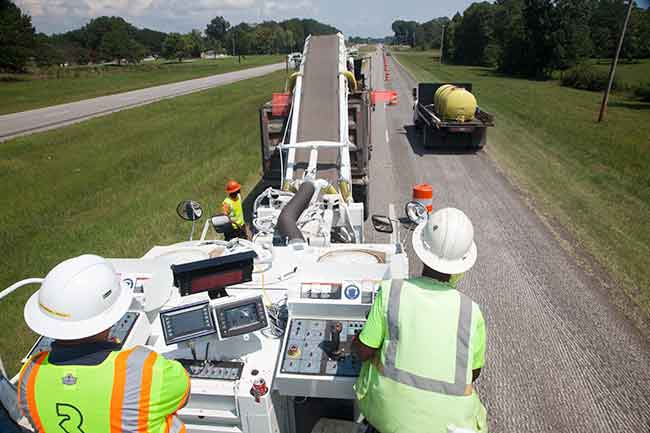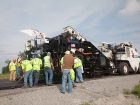
Features
Columns
Education
Contractor Training
Cultivating the trainer within supervisors and managers
March 31, 2016 By Jeff Ensell director of training roadtec inc.

April 18, 2016 – Training… why do it? The short and simple answer to the question of why bother with construction training is twofold: safety and productivity.
Accidents and injuries are a costly unnecessary risk to valued employees, expensive equipment, and company morale. And well-trained employees are not only safer, but feel more competent and confortable on a work site, which translates to higher productivity and emanates beyond a site… fostering a positive reputation within and outside the company.
Travel almost anywhere and watch construction crews. There are great ones, and there are crews that really struggle. The struggle can be battles with each other or the lack of training to do the task assigned to them by the foreman.
The idea of training is broader than a formal function occurring in a classroom or at a field site. Training should be considered a responsibility of every supervisor and manager, since they are in the best position to help cultivate their crew’s skills and knowledge. Supervisors and managers are promoted to their positions because of their experience and expertise…they know what they’re doing.
For success today, management should only be allowed to keep their positions if they are also effective communicators in sharing what they know. People who are afraid to share knowledge should never lead and people that belittle others for not knowing as much as they do will never inspire others to grow and succeed. Good, strong managers and supervisors inspire their crews to do great things and be productive. Senior company management needs to support this concept that everyone is responsible for training. With managers and supervisors functioning as leaders and mentors generous with their knowledge and help, workers learn to help their coworkers avoid mistakes and perform tasks better.
As new technology, ideas, processes, and procedures get introduced to the company there is a need for the managers or supervisors who excel at training to be tapped.
In-house trainers should be chosen out of the best you have available. The thinking can’t be, “Hey, I can’t lose that guy to training!” Generally speaking, a contractor’s cream of the crop manager has done every aspect of the job and can relate to what the crews face day in and day out. And who better to teach than that individual?
Trainers should be able to communicate effectively and be able to keep the hard hat on; not throw it down in frustration. Contractors who have found workers who want to work is half the battle today. Keeping them engaged in the process is where a trainer can help. The work is hard and the days and nights are long, so if the trainer is screaming, they will not receive the respect they deserve, nor will they be motivated.
A trainer’s personality and humour can go a long way with crews and make workers want to come back for additional training. Being able to teach a person and show them the correct methods will build a relationship between the trainer and the trainee.
In-house trainers need to teach the same things to each crew. Consistency is vital for a productive crew. For example in asphalt paving, crews that take off from the joint consistently, carry a consistent head of material, keep a consistent travel speed and use the grade control systems consistently are by far more productive. Not only will they be productive but they will be together longer as a crew – and this is a sign that training is paying off. People want to be a part of the best crew; it’s human nature.
Trainers should promote teamwork. Cross-training every position within the crew is key. When a crew member is out, there should be another who can take their place. Not only should they be able to fill the position, but they should also understand the importance of that person’s position on the team – the old “walk a mile in my boots.”
Trainers need to be involved with every significant project from the start. When the project starts, so should a trainer. Every company has rework that could have been prevented. Consider that one asphalt-paving job of remove and replace on a high profile job, can be justification enough for having proper training before the project starts.
Senior management at a contractor level, needs to be able to empower its trainers to ask the tough questions at a work site and troubleshoot when necessary. They need to be asking if everything is running okay, tasks are being safely performed, and if the workers are implementing the training they received? Trainers at the site need to be 100 per cent capable of making quality adjustments that improve productivity and ensure the best results. Their presence on the jobsite can send a powerful message to the crew and the owners of the project.
So why train? Because it works. It promotes safety and quality results. It can inspire workers to be a part of something bigger… something greater. Clearly, when a construction contractor commits to making its workers the best, the workers will give their best. When workers are inspired to go to work and do their best for the company, this is the ultimate return on investment.
Print this page


